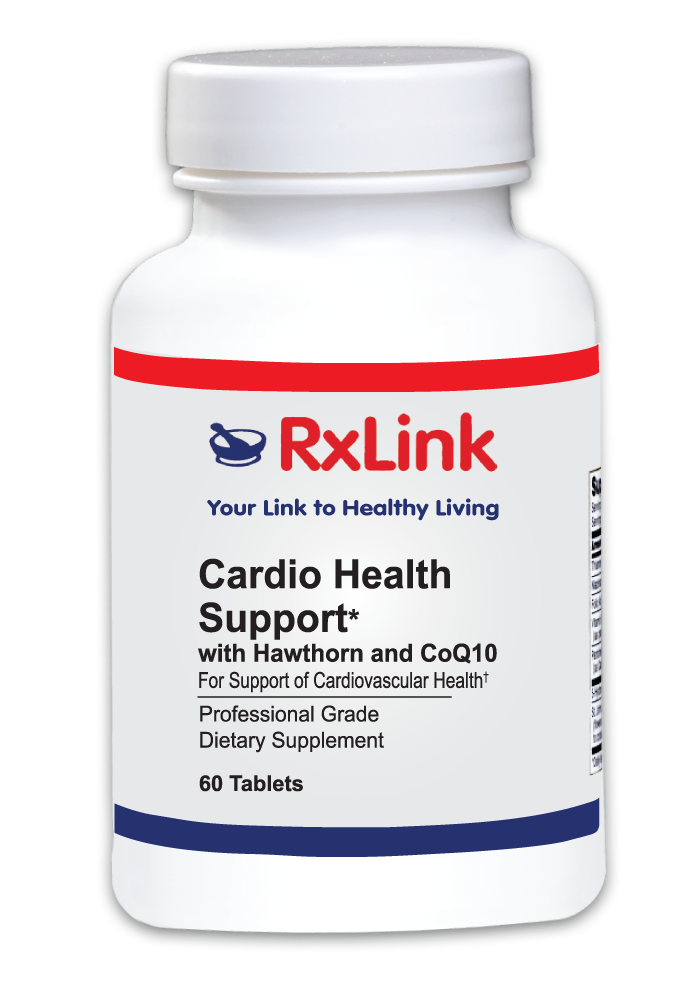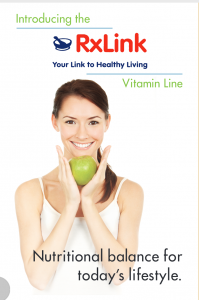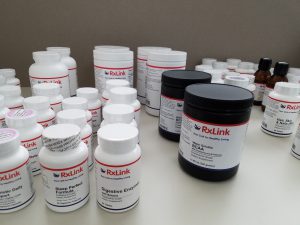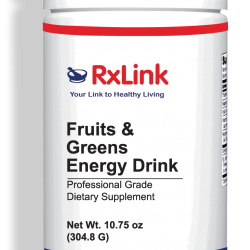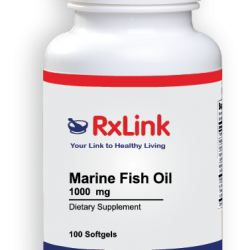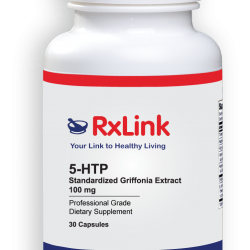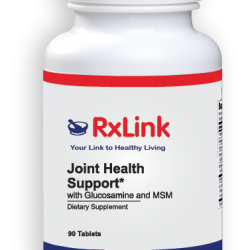Description
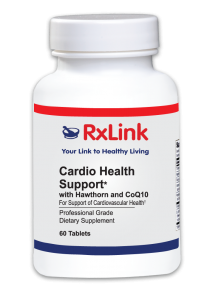
DESCRIPTION
RxLink Cardio Health Support formula provides the foundation for a healthy cardiovascular system by supplying the many nutrients, herbs, and other cofactors that help protect against the damaging effects of free radicals and homocysteine and help support cardiovascular function.
FUNCTIONS
The average heart beats approximately 100,000 times a day, pumping close to 2,000 gallons of blood through its chambers. This level of activity requires significant nutritional support. In addition to the heart’s nutritional needs, compounds like free radicals and homocysteine are a constant threat to its health and function. Cardio Health Support can be regarded as two separate formulas – nutritional support for metabolic requirements and protective support to fend off free radicals and lower homocysteine levels. Nutritional support starts with magnesium, which helps support normal heart rhythm. Since the heart’s primary fuel source is fatty acids, carnitine is added to assist in fatty acid metabolism. The heart has some of the highest concentrations of coenzyme Q10 (CoQ10) in the body. Without CoQ10, the heart – and the rest of the body – ceases to function. Hawthorn has traditionally been used for heart conditions and there is evidence to suggest that it exerts and inotropic effect that may help support heart function. Like hawthorn, the amino acid taurine helps regulate the contractile force of heart muscle. Additional studies demonstrate that taurine may reduce the secretion of apolipoprotein B100, a compound that is considered a major risk factor for heart disease. The protective function of Cardio Health Support stems from the blend of antioxidants and nutrients to lower homocysteine levels. Vitamins E and C are important fat- and water-soluble antioxidants respectively. Other antioxidants include green tea, grape seed extract, citrus bioflavonoids, and CoQ10. Horsechestnut contains several compounds shown to support healthy vascular function and tone. Vitamins B-6, B-12, and folic acid help to maintain healthy levels of homocysteine. Finally, numerous studies on niacin and soy support their roles in supporting healthy cholesterol levels.
INDICATIONS
RxLink Cardio Health Support may be a useful dietary supplement for those looking to support healthy cardiac function, healthy homocysteine levels and reduce free radicals.
SUGGESTED USE
Adults take 3 tablets daily with meals or as directed by a healthcare professional. SIDE EFFECTS No adverse effects have been reported.
FORMULA
(RxLink10029) 3 Tablets Contain:
Vitamin C (as ascorbic acid) ………………..100 mg
Vitamin E (as d-alpha) ………………………25 IU
Niacin …………………………………….25 mg
Vitamin B-6 (as pyridoxine HCl) ……………………..5 mg
Folic Acid ………………………………………400 mcg
Vitamin B-12 (as cyanocobalamin) …………………….5 mcg
Magnesium (as oxide, amino acid chelate) ……………400 mg
Coenzyme Q10 ……………………………………..60 mg
Hawthorn flower & Leaf extract …………………….100 mg
(Standardized to 1.8% [1.8 mg] vitexin)
L-carnitine (as tartrate) …………………………500 mg
Soybean extract ………………………………….250 mg
(Glycine max standardized to 2.5-3.5% [6.25-8.75 mg]isoflavones)
Horsechestnut seed extract ………………………..100 mg
(Standardized to 20% [20 mg] aescin)
Taurine …………………………………………500 mg
Green tea leaf extract …………………………….50 mg
(Standardized to 50% [25 mg] epicatechin)
Grape seed extract (Vitis vinifera) ………………….5 mg
Citrus bioflavonoids ………………………………50 mg
Cayenne fruit (Capsicum annuum) …………………….25 mg
Other Ingredients: cellulose, stearic acid, cellulose gum, silica, magnesium stearate, and dicalcium phosphate. This product contains NO added dairy, yeast, wheat, corn, preservatives, artificial colors or flavors.
STORAGE
Store in a cool, dry place, away from direct light. Keep out of reach of children.
REFERENCES
Miller JW, Nadeau MR, Smith D and Selhub J (1994). “Vitamin B-6 deficiency vs folate deficiency: comparison of responses to methionine loading in rats”. American Journal of Clinical Nutrition 59 (5): 1033–1039. Katzung, Bertram G. (2006). Basic and clinical pharmacology. New York: McGraw-Hill Medical Publishing Division. Bartels GL, Remme WJ, Pillay M et al. (July 1994). “Effects of L-propionylcarnitine on ischemia-induced myocardial dysfunction in men with angina pectoris”. The American Journal of Cardiology 74 (2): 125–130. Pittler MH, Guo R, Ernst E (2008). Hawthorn extract for treating chronic heart failure. In Guo, Ruoling. “Cochrane Database of Systematic Reviews”. Cochrane Database Syst Rev Jan 23 (1) Horse chestnut seed extract. In: Blumenthal M, Goldberg A, Brinckman J, eds. Herbal Medicine Expanded Commission E Monographs. Newton, MA: Lippincott Williams & Wilkins; 2000:201–204. Huxtable, RJ (1992). “Physiological actions of taurine”. Physiol Rev 72 (1): 101–63. Yanagita, T; Han, SY; Hu, Y; Nagao, K; Kitajima, H; Murakami, S (2008). “Taurine reduces the secretion of apolipoprotein B100 and lipids in HepG2 cells”. Lipids in Health and Disease 7: 38. Zhang, M; Bi, LF; Fang, JH; Su, XL; Da, GL; Kuwamori, T; Kagamimori, S (2004). “Beneficial effects of taurine on serum lipids in overweight or obese non-diabetic subjects”. Amino Acids 26 (3): 267–71. Anderson, James W.; Johnstone, Bryan M.; Cook-Newell, Margaret E. (1995). “Meta-Analysis of the Effects of Soy Protein Intake on Serum Lipids”. New England Journal of Medicine (Massachusetts Medical Society) 333 (5): 276–282. RxLink

